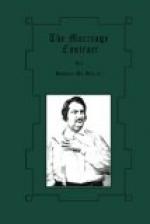“Our rights,” replied Solonet.
“Specify them, my friend,” said Mathias. “What do you bring us? Where is the inventory of the property left by Monsieur Evangelista? Show me the liquidation, the investment of the amount. Where is your capital? —if there is any capital. Where is your landed property?—if you have any. In short, let us see your guardianship account, and tell us what you bring and what your mother will secure to us.”
“Does Monsieur le Comte de Manerville love Mademoiselle Evangelista?”
“He wishes to make her his wife if the marriage can be suitably arranged,” said the old notary. “I am not a child; this matter concerns our business, and not our feelings.”
“The marriage will be off unless you show generous feeling; and for this reason,” continued Solonet. “No inventory was made at the death of our husband; we are Spaniards, Creoles, and know nothing of French laws. Besides, we were too deeply grieved at our loss to think at such a time of the miserable formalities which occupy cold hearts. It is publicly well known that our late husband adored us, and that we mourned for him sincerely. If we did have a settlement of accounts with a short inventory attached, made, as one may say, by common report, you can thank our surrogate guardian, who obliged us to establish a status and assign to our daughter a fortune, such as it is, at a time when we were forced to withdraw from London our English securities, the capital of which was immense, and re-invest the proceeds in Paris, where interests were doubled.”
“Don’t talk nonsense to me. There are various ways of verifying the property. What was the amount of your legacy tax? Those figures will enable us to get at the total. Come to the point. Tell us frankly what you received from the father’s estate and how much remains of it. If we are very much in love we’ll see then what we can do.”
“If you are marrying us for our money you can go about your business. We have claims to more than a million; but all that remains to our mother is this house and furniture and four hundred odd thousand francs invested about 1817 in the Five-per-cents, which yield about forty-thousand francs a year.”
“Then why do you live in a style that requires one hundred thousand a year at the least?” cried Mathias, horror-stricken.
“Our daughter has cost us the eyes out of our head,” replied Solonet. “Besides, we like to spend money. Your jeremiads, let me tell you, won’t recover two farthings of the money.”




